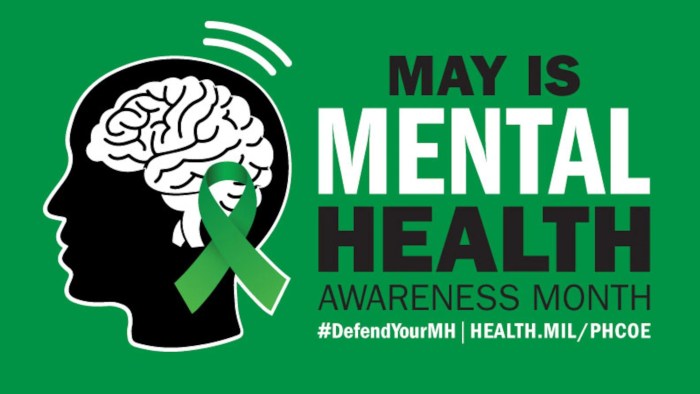Diving into mental health awareness, this intro brings the spotlight on why it’s vital in today’s society. From breaking stigmas to fostering positive change, let’s explore the impact together.
Let’s uncover the strategies for promoting mental health awareness and how social media, education, and cultural perspectives play a role in shaping our understanding.
Importance of Mental Health Awareness

Mental health awareness is crucial in society because it helps break down the stigma surrounding mental health issues. By increasing awareness, individuals are more likely to seek help and support, leading to better mental well-being.
Positive Impact on Individuals
- Increased awareness can help individuals recognize the signs of mental health issues in themselves or others, allowing for early intervention and treatment.
- It can also reduce feelings of isolation and shame, as individuals realize they are not alone in their struggles.
- Access to resources and support services becomes more readily available, improving overall mental health outcomes.
Positive Impact on Communities
- Communities become more empathetic and understanding towards individuals facing mental health challenges, creating a supportive environment.
- Reduced stigma leads to more open conversations about mental health, breaking down barriers to seeking help.
- Overall well-being of the community improves as mental health is prioritized and addressed effectively.
Combatting Stigma
- Increased awareness helps challenge misconceptions and stereotypes surrounding mental health, promoting acceptance and inclusivity.
- Education on mental health issues reduces discrimination and encourages empathy towards those struggling with their mental well-being.
- Through awareness campaigns and advocacy efforts, the negative stigma associated with mental health can be dismantled, creating a more supportive society for all individuals.
Ways to Promote Mental Health Awareness
Promoting mental health awareness is crucial in breaking the stigma surrounding mental health issues and encouraging individuals to seek help when needed. There are various strategies that can be utilized to effectively raise awareness about mental health.
Education as a Tool for Promoting Mental Health Awareness
Education plays a vital role in promoting mental health awareness. By integrating mental health education into school curriculums, students can learn about the importance of mental health, how to recognize signs of mental illness, and where to seek help. Training teachers and school staff on mental health first aid can also help create a supportive environment for students struggling with their mental health.
Community Engagement and Campaigns
Community engagement and awareness campaigns are powerful tools for promoting mental health awareness. Organizing events, workshops, and seminars to educate the public about mental health issues can help reduce stigma and increase understanding. Social media campaigns, such as sharing personal stories or mental health resources, can also reach a wider audience and encourage open conversations about mental health.
Partnerships with Mental Health Organizations
Collaborating with mental health organizations and professionals can amplify efforts to promote mental health awareness. Partnering with experts in the field can provide valuable insights and resources for creating effective awareness campaigns. By working together, organizations can reach more people and make a greater impact in raising awareness about mental health.
The Impact of Social Media on Mental Health Awareness

Social media platforms play a significant role in spreading awareness about mental health. They provide a powerful tool for reaching a wide audience and initiating important conversations about mental well-being.
Utilizing Social Media for Mental Health Awareness
- Social media allows individuals to share personal stories and experiences related to mental health, reducing stigma and fostering a sense of community.
- Organizations and mental health advocates can use social media to share resources, information, and support helplines for those in need.
- Hashtags and campaigns dedicated to mental health awareness can go viral on social media, reaching millions of users and sparking meaningful discussions.
Potential Drawbacks of Relying on Social Media
- Social media platforms can sometimes perpetuate harmful stereotypes and misinformation about mental health, leading to confusion and misunderstanding.
- Excessive exposure to negative content related to mental health issues on social media can trigger anxiety and depression in vulnerable individuals.
- Cyberbullying and trolling on social media can have detrimental effects on the mental health of individuals, especially young people.
Tips for Using Social Media Responsibly
- Verify the credibility of sources before sharing mental health information on social media to prevent the spread of false information.
- Engage in constructive and empathetic conversations about mental health on social media, promoting understanding and support among users.
- Set boundaries for social media use to prevent burnout and prioritize self-care for your mental well-being.
Cultural Perspectives on Mental Health Awareness
In different cultures, mental health awareness can vary significantly based on beliefs, traditions, and societal norms. Understanding and respecting these cultural perspectives is crucial in promoting mental health awareness effectively.
Challenges of Promoting Mental Health Awareness in Diverse Cultural Contexts
- Language barriers can hinder communication about mental health issues in multicultural communities.
- Stigma associated with mental health may be more pronounced in certain cultural groups, making it challenging to address.
- Different cultural attitudes towards seeking help for mental health problems can impact awareness efforts.
Examples of Cultural Practices Impacting Mental Health Awareness
-
In some cultures, mental health issues are seen as a sign of weakness, leading to reluctance in seeking treatment.
-
Traditional healing practices in certain cultures may complement or conflict with Western mental health approaches.
-
Cultural celebrations and rituals can either provide social support or exacerbate mental health challenges.



